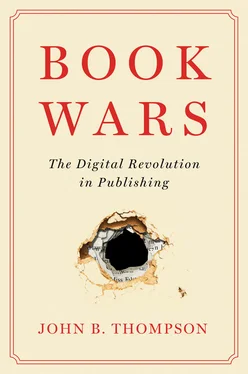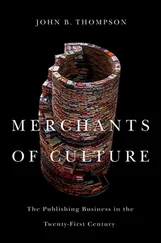Of course, it would be much easier to write the history of the digital revolution in publishing if we had all the advantages of hindsight, if we could transport ourselves forward to the year 2030 or 2040 or 2050, look back at the publishing industry and ask ourselves how it had been changed by the digital revolution. We would have lots of historical data to scrutinize and some of the people who had lived through the transformation would still be around to talk about it. It is much more difficult to write this history when you’re in the middle of it. What can you say about a technological revolution that is still so young, still just beginning to disrupt the traditional practices of an old and well-established industry when, undoubtedly, there is still so much more to come? How can you speak and write with any confidence about a world that is still in the throes of change, where so much is still unsettled and where everyone in the industry is still struggling to make sense of what is happening around them? How, in other words, do you recount a revolution in medias res ?
To this question, there is no easy answer, and any account we give will have to be hedged with conditions and qualifications. But at least it is easier to try to give an account of this kind from the vantage point of 2020 than it would have been in 2010 or 2012 or 2015. By 2020, we have had more than a decade of serious ebook sales, so the patterns have had longer to establish themselves and will have achieved a degree of clarity they didn’t have when ebooks were just beginning to take off. Some of the early experiments and more radical projects in digital publishing will have been tried and tested, some will have succeeded and many will have failed, and both the successes and the failures will tell us something about what is viable in this domain and what is not. Moreover, after ten years, the novelty factor will have worn off to some extent and early developments that may have been affected by the attractions of the new may have given way to patterns that reflect more enduring preferences and tastes. All of these are reasons (albeit small) to think that, while a time machine would have made our task much easier, it may not be impossible to say something worthwhile about a transformation that is still under way.
Not only is it difficult to discern what is most important when writing about a process that is still under way, it is also impossible to provide an account that is fully up to date. What I have tried to provide here is not so much a snapshot in time but rather a dynamic portrait of a field in motion, as individuals and organizations within the field struggle to make sense of, adapt to and take advantage of the changes that are taking place around them. To do this properly, you have to home in on some of these individuals and organizations and follow them as they seek to forge a path in the midst of uncertainty, reconstruct the options they faced, the choices they made and the developments that affected them at different points in time. But you can only follow them so far: at some point the story must be cut off and drawn to a close. History is frozen in the act of writing it, and the account you offer will always necessarily refer to a time that precedes the moment when your account is read. As soon as you finish a text, the world moves on and the portrait you have painted is outdated: instant obsolescence is the fate that awaits every chronicler of the present. There is no alternative but to embrace this fate and hope that readers will have a capacious understanding of timeliness.
Most of the research on which this book is based took place between 2013 and 2019, during which time I did more than 180 interviews with senior executives and other staff in a variety of organizations in the US and the UK, mainly in New York, London and Silicon Valley – organizations ranging from the large trade publishers to numerous start-ups, self-publishing organizations and innovative publishing ventures. (A detailed account of my research methods and sources can be found in appendix 2.) When it was helpful and relevant to do so, I also drew on some of the 280 interviews that I had conducted previously for Merchants of Culture . I am very grateful to the Andrew W. Mellon Foundation in New York, which funded the research from 2013 to 2019 (Grant 11300709) and enabled me to spend extended periods of time in the field, and grateful to the Economic and Social Research Council in the UK, which funded the earlier research (RES-000-22-1292). I am also very grateful to the many organizations which opened their doors to me, gave me access to their staff and, in some cases, their data; most sources of data are acknowledged in the text, although there are instances where data were provided on condition that the source remains anonymous and, where this is the case, I have scrupulously honoured this commitment. Above all, I am deeply grateful to the many individuals who gave very generously of their time, allowing me to interview them, sometimes repeatedly over several years: I simply could not have written this book without their help. I have quoted directly from only a small proportion of these interviews, and only a fraction of the organizations I studied are used as case studies in the book, but every interview was invaluable in terms of deepening my understanding of a world in flux and the many players who are active, or were active, in it. Most of the individuals I interviewed remain anonymous and I often use pseudonyms when referring both to individuals and to companies. But there are occasions when the real names of interviewees and their companies are used, always with their consent, simply because their stories are so unique that it would be impossible to write about them with any degree of rigour and preserve anonymity. When the real name of an individual is used, the full name is given – first name plus surname – on the first occasion of use. When I use a pseudonym, by contrast, I use an invented first name only – Tom, Sarah, etc. – on the first and subsequent occasions. When I use a pseudonym for a company, I put the pseudonym in inverted commas on the first occasion of use – ‘Everest’, ‘Olympic’, etc. (Again, these conventions and the rationale are explained more fully in appendix 2.)
On those occasions where I quoted from interviews with individuals who are given their real names in the text, I subsequently wrote to these individuals, sent them the text I had written about them and/or their organization, and gave them the opportunity to comment on it: many did so, sometimes in considerable detail, and I took account of their comments in the final version of the text. I am very grateful to these individuals for their willingness to read these texts and provide me with feedback. I am also very grateful to Michael Cader, Angus Phillips and Michael Schudson who read the entire text, and to Jane Friedman and Michele Cobbs who read the chapters dealing with their areas of expertise (self-publishing and audiobooks, respectively): they provided me with many helpful comments and suggestions and saved me from numerous errors and oversights. Any errors that remain are, of course, my own. I am grateful to Leigh Mueller for her meticulous copyediting and to the many people at Polity – including Neil de Cort, Rachel Moore, Evie Deavall, Julia Davies, Clare Ansell, Sue Pope, Sarah Dobson, Breffni O’Connor, Adrienn Jelinek, Clara Ross, Madeline Sharaga, Emma Longstaff, Lydia Davis and Lucas Jones – who steered this book through the publication process. My thanks, finally, to Mirca and Alex, who displayed uncommon patience and understanding over the years when this book was in gestation and who endured a very cold winter in New York while some of the research was being done: this book is for them, small recompense for the many sacrifices they made while it was being written.
Читать дальше












